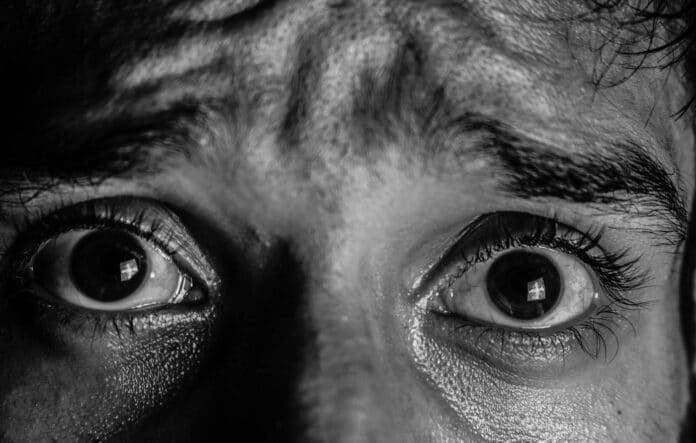That’s the succinct definition of phobias right there in the title. Everyone has something they fear.
Sometimes, these fears are so intense that the mere thought of them can cause anxiety or panic attacks, and people try to avoid them at all costs. But let’s stop being vague and apply a technical touch to this article.
Phobia: Etymology
The word phobia comes from the Greek word “phobos,” which means “fear” or “horror.” In ancient Greek mythology, Phobos is the god and personification of fear and panic, the son of Ares and Aphrodite. His brother Deimos served to represent the feelings of dread and terror that befell those before a battle.
Sorry, I’m a bit of a mythology geek.

Either way, a phobia is an irrational fear of something. When someone has a phobia, they experience intense fear of a certain object or situation. It could also be a person (like a doctor or a clown), or an activity.
Having a phobia does not just mean that someone is scared of something. People with phobias have an exaggerated fear response, and while they are generally aware that their fear is irrational, they will nonetheless experience severe anxiety upon exposure to their phobia. In severe cases, they may even rearrange their lives to avoid the situation or thing that is causing their anxiety.
Phobias are different from regular fears because they cause significant distress and can interfere with the person’s life.
If you have a phobia, you may experience severe anxiety and panic attacks when you’re:
- exposed to the object or situation
- anticipating an encounter with your phobia
- thinking about the thing that scares you
According to the Diagnostic and Statistical Manual of Mental Disorders, 5th edition, text revision (DSM-5-TR), specific phobias are anxiety disorders. In addition, New research indicates that specific phobias affect approximately 5–10% of the general population.
RELATED: Social Anxiety: Causes and Symptoms
Types of phobias
There are three broad phobia categories: specific phobias, social phobias, and agoraphobia.
Specific phobias
Specific, or “simple,” phobias are those that relate to a particular object or situation. There are five types of specific phobias:
- Animal-related (dogs, insects, spiders)
- Blood or injury-related (Broken bones, injections, falls)
- Natural environment-related (darkness, heights, thunder)
- Situation-related (driving, flying, riding an elevator)
- Others (loud noises, choking)
There’s no official list of phobias beyond what’s outlined in the DSM-5, hence these categories encompass an infinite number of specific objects and situations. That being said, clinicians and researchers create names for them as the need arises. This is typically done by combining a Greek (or sometimes Latin) prefix that describes the phobia with the –phobia suffix.
READ ALSO:
- 40+ Deep Aesthetic Quotes that Inspire Inner Peace
- 4 Food Synergy Ideas That Promote Health
- Fixed Mindset vs Growth Mindset: Which Do You Need More?
- Improve Your Mindset Now
For example, a fear of water would be named by combining “hydro” (water) and “phobia” (fear). There’s also such a thing as a fear of fears (phobophobia).

This is actually more common than you might imagine. Fear is an irrational thing, and you can find it where you least expect it.
Social phobias
A social phobia is an extreme fear of being in situations that may cause embarrassment or humiliation in public. An example is a fear of public speaking.
Agoraphobia
Agoraphobia is a fear of being in public spaces or crowded areas without an easy means of escape. In severe cases, people with agoraphobia become housebound because they are afraid to leave their safe spaces.
Social phobias and agoraphobia are more likely to cause life impairment because the situation or thing that causes the phobia is a lot more difficult to avoid.
SEE: 20+ Pet Peeves That Make You Want To Break Something
List of specific phobias
Common phobias
People with phobias actively avoid the phobic object or situation, or they endure it with intense fear or anxiety.
Here’s a look at some common types phobias that have been identified.
| A | |
| achluophobia | fear of darkness |
| acrophobia | fear of heights |
| aerophobia | fear of flying |
| agoraphobia | fear of public spaces or crowds |
| aichmophobia | fear of needles or pointed objects |
| ailurophobia | fear of cats |
| alektorophobia | fear of chickens |
| algophobia | fear of pain |
| amaxophobia | fear of riding in a car |
| androphobia | fear of men |
| anginophobia | fear of angina or choking |
| anthophobia | fear of flowers |
| anthropophobia | fear of people or society |
| aphenphosmphobia | fear of being touched |
| arachnophobia | fear of spiders |
| arithmophobia | fear of numbers |
| astraphobia | fear of thunder and lightning |
| ataxophobia | fear of disorder or untidiness |
| atelophobia | fear of imperfection |
| atychiphobia | fear of failure |
| autophobia | fear of being alone |
| B | |
| bacteriophobia | fear of bacteria |
| barophobia | fear of gravity |
| bathmophobia | fear of stairs or steep slopes |
| batrachophobia | fear of amphibians |
| belonephobia | fear of pins and needles |
| bibliophobia | fear of books |
| botanophobia | fear of plants |
| C | |
| cacophobia | fear of ugliness |
| catagelophobia | fear of being ridiculed |
| catoptrophobia | fear of mirrors |
| chionophobia | fear of snow |
| chromophobia | fear of colors |
| chronomentrophobia | fear of clocks |
| cibophobia | fear of food |
| claustrophobia | fear of confined spaces |
| coulrophobia | fear of clowns |
| cyberphobia | fear of computers |
| cynophobia | fear of dogs |
| D | |
| dendrophobia | fear of trees |
| dentophobia | fear of dentists |
| domatophobia | fear of houses |
| dystychiphobia | fear of accidents |
| E | |
| entomophobia | fear of insects |
| ephebiphobia | fear of teenagers |
| equinophobia | fear of horses |
| G | |
| gamophobia | fear of marriage or commitment |
| genuphobia | fear of knees |
| glossophobia | fear of speaking in public |
| gynophobia | fear of women |
| H | |
| heliophobia | fear of the sun |
| hemophobia | fear of blood |
| herpetophobia | fear of reptiles |
| hydrophobia | fear of water |
| hypochondria | fear of illness |
| I–K | |
| iatrophobia | fear of doctors |
| insectophobia | fear of insects |
| koinoniphobia | fear of rooms full of people |
| L | |
| leukophobia | fear of the color white |
| lilapsophobia | fear of tornadoes and hurricanes |
| lockiophobia | fear of childbirth |
| M | |
| mageirocophobia | fear of cooking |
| megalophobia | fear of large things |
| melanophobia | fear of the color black |
| microphobia | fear of small things |
| mysophobia | fear of dirt and germs |
| N | |
| necrophobia | fear of death or dead things |
| noctiphobia | fear of the night |
| nosocomephobia | fear of hospitals |
| nyctophobia | fear of the dark |
| O | |
| obesophobia | fear of gaining weight |
| octophobia | fear of the number 8 |
| ombrophobia | fear of rain |
| ophidiophobia | fear of snakes |
| ornithophobia | fear of birds |
| P | |
| papyrophobia | fear of paper |
| paruresis | fear of urinating in public places or in the presence of others |
| pathophobia | fear of disease |
| pedophobia | fear of children |
| philophobia | fear of love |
| phobophobia | fear of phobias |
| podophobia | fear of feet |
| pogonophobia | fear of beards |
| porphyrophobia | fear of the color purple |
| pteridophobia | fear of ferns |
| pteromerhanophobia | fear of flying |
| pyrophobia | fear of fire |
| Q–S | |
| samhainophobia | fear of Halloween |
| scolionophobia | fear of school |
| selenophobia | fear of the moon |
| sociophobia | fear of social evaluation |
| somniphobia | fear of sleep |
| T | |
| tachophobia | fear of speed |
| technophobia | fear of technology |
| thalassophobia | fear of deep water |
| tonitrophobia | fear of thunder |
| trypanophobia | fear of needles or injections |
| trypophobia | fear of clustered patterns of holes |
| U–Z | |
| venustraphobia | fear of beautiful women |
| verminophobia | fear of germs |
| wiccaphobia | fear of witches and witchcraft |
| xenophobia | fear of strangers or foreigners |
| zoophobia | fear of animals |
READ ALSO: Mental Health: Cultural Perceptions and How To Deal With It In Nigeria
Rare phobias
While you may have heard of some of the more common phobias, some rarer phobias include:
- anatidaephobia: fear of ducks watching you
- ambulophobia: fear of walking
- emetophobia: fear of vomiting
- haphephobia: fear of being touched
- megalophobia: fear of large objects
- nomophobia: fear of being without your phone
- plutophobia: fear of money
- scopophobia: fear of being stared at
The longest phobia word
The longest phobia word is hippopotomonstroses-quippedaliophobia, which ironically stands for fear of long words.

There isn’t any research on this condition; this makes it hard to know its origins and how it affects people.
SEE: 50 Empowering Know Your Worth Quotes To Boost Your Confidence
What is the scariest phobia?
While this is subjective, one phobia that can cause significant distress is phasmophobia, or fear of the supernatural or ghosts.
Research from 2018 indicates that fear of the supernatural is associated with several distinct symptoms such as:
- being fearful of sleeping alone at night
- daytime sleepiness
- dissociative sleep
- nighttime panic attacks
- psychosis
This research suggests that this fear often deve
Treatment of phobias
There are several treatments available for phobias. A 2020 study examined the effectiveness of multiple treatments, such as therapy and medication for specific phobias.
Some types of treatment that may be helpful for phobias include:
Antianxiety medication
Your doctor may recommend certain anxiety-reducing medications that can help you through exposure therapy. While these medications aren’t exactly a treatment for phobias, they can help make exposure therapy less distressing.
Exposure therapy
This is a type of cognitive behavioral therapy where you work with a psychologist to learn how to desensitize yourself to that which you fear. The goal is to improve your quality of life so that you’re no longer hindered or distressed by your fear.
SEE: How to Overcome Insecurities
Other medications
Your clinician might also prescribe beta-blockers and benzodiazepines to manage feelings of anxiety or panic.
Other types of therapy that can help with phobias include:
- Cognitive behavioral therapy (CBT)
- Eye movement desensitization and reprocessing therapy (EMDR)
- Systematic desensitization
- Applied muscle tension (AMT)
- Psychoeducation
- Haptotherapy
However, there is limited evidence to suggest that medication helps treat specific phobias. So, if you’re considering treatment for a specific phobia, consider speaking with a mental health professional near you to find treatment options.
Phobias: It’s a wrap
A phobia is an overwhelming or debilitating fear of a particular situation or thing that likely does not pose any real danger. And apart from that, specific phobias are prevalent worldwide. So, while you may experience common fears such as heights or snakes, you may also become phobic of something less familiar.
Avoidance may be typical for you if you’re dealing with a phobia. And while this means you don’t have to face the anxiety, avoiding may only make confronting the object you’re afraid of more anxiety-provoking when you have to confront it.
So, if you have a phobia that’s disrupting your life, speak with your doctor for an evaluation and treatment options. Remember, though, that you aren’t alone.






